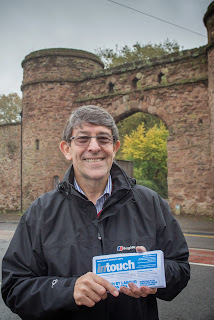Local by-elections: LGA First News
While I thought that the turnout in our Arbury Ward Nuneaton election was low at 17%, of the 13 by-elections listed in the above, 3 others had lower turnouts. Manchester: Ancoats and Clayton (Lab hold) 11%, Liverpool: Riverside (Lab hold) 12% and Chelmsford: South-Woodham-Elmwood (SWF gain from Con) 14%.
Of the others, only Bracknell Forest: Winkfield and Cranborne (Con hold) at 27% was over 25%.
Maybe it's the time of year? Certainly here in Nuneaton, the siting of polling booths in one district didn't help.
Finally, unfortunately, only we in the Arbury Ward Nuneaton were able to record a con gain. Thank you team and voters!
Tuesday, 17 December 2013
Friday, 13 December 2013
NBBC Council Wednesday 11 December 2013
Question by Cllr Jeff Morgan
"Does Cllr Harvey now accept, following our Conservative by-election victory in the Arbury Ward, that the residents of Arbury and Nuneaton more widely through our petitions, feel deeply let down by Labour with regard to the flawed Borough Plan and are rejecting it, by letting their votes do the talking?"
Unfortunately the Mayor (Lab, Cllr Bob Copland) did not allow any supplementaries so I was unable to come back on those points.
BTW as they say in txt spk, Labour are artfully trying to paint us Conservatives into a corner regarding the very upstream issue of replacing the county's district councils in favour of one unitary. We tabled an amendment to his motion, seeking more information before going further, but that was lost and then the motion was passed with the usual majority. Cllr Harvey forced a recorded vote, seeking to portray us as being in favour of abolishing Nuneaton and Bedworth borough Council.
Our position is not that we want to abolish our local council, but that much more information is needed about the discussions Cllr Seccombe is going to have and their outcome. We remain committed to a system of governance which is as local as effectively possible for the people of Nuneaton and Bedworth, bearing in mind the overall burden to council tax payers. We could be talking about savings of £100ks here, but until such time as we can see what we’re voting for, we reserve our position
Wednesday, 3 July 2013
Don McCullin
“Imagine.........Don
McCullin” BBC One 10.35pm Tuesday 2 July 2013.
Sundays didn’t used to be Sundays without “The Sunday Times.” The paper was de rigueur throughout the sixties and seventies and the magazine
was something one always looked forward to and opened first. Under the editorship of Harold Evans, the
Insight Team always carried investigative stories of the highest journalistic
quality and the magazine had the iconic images of the age. As a student in the sixties, the paper always
seemed to be around, usually strewn around on the floor along with Saturday
night’s beer bottles.
They say about this period, that if you can remember it, you
weren’t actually there. I was and wasn’t
in a funny way. I had a habit of just
missing where the action was. I missed
The Stones in Hyde Park by one day.......got it wrong man. I missed the
Grosvenor Square demos and got to Paris too late, but one man who really was
there throughout the sixties and seventies, who saw it all and too much of it was
the photographer Don McCullin.
Born in a very tough area of London, Don McCullin became,
almost by chance, the pre-eminent war photojournalist of his day. The
Greek/Turkish conflict in Cyprus, the Vietnam War, Biafra, Northern Ireland,
the appalling killings in The Lebanon by Christians and Muslims, all were
harrowingly recorded through his lens. The outstanding film by Jacqui and Don Collins
shown last night in the “Imagine....” series by Alan Yentob gave a moving and
disturbing account of his life in the killing fields and the emotional effect
this has had on him. He is a man who
seldom smiles: you feel his humour has gone, drained away by the inhumanity he
has witnessed.
What always amazes me about his photographs is that somehow,
despite the grim nature of the subjects, the bodies and the suffering and the
speed of the action, his composition is remarkable. The famous photo of the Cypriot woman in
tears with her arms outstretched after yet another killing is a masterpiece of
lines, angles and balance. Sometimes he
is honest enough to admit that his art is fortuitous, as with the photograph of
the charging troops in the streets of Londonderry, where he just happened to
capture a terrified woman too, cowering in a doorway. How did he do it? That’s what I want to know. Armed with nothing more than a 35mm Nikon SLR
and a few rolls of black and white film, he produced staggering images of
contrast, composition, detail and emotion.
It’s hard to talk about aesthetics when looking at mangled bodies yet
somehow this man created art from scenes of hell and he constantly worried
about the morality of his presence as a spectator before such suffering.
We do not see this sort of action photojournalism any
more. Maybe it’s the influence of
television which has swamped the still image; maybe it’s the economics of
newspapers, locked into revenue battles with declining readerships. I thought it was revealing that after Rupert Murdoch
bought “The Sunday Times” and sacked Harold Evans, the work dried up for
McCullin. Indeed under the editorship of
Andrew Neil, he was not sent to cover The Falklands’ War in 1982. The magazine had become too fearful of losing
advertising to carry photos of dying, starving children from around the world.
These days McCullin at 75 seems to be in rehab. He is purging his soul of his nightmares by
shooting the English landscape, still on film and still in black and white
though.
Subscribe to:
Comments (Atom)

